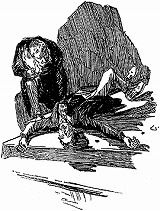“It all seems to centre round that bust of Napoleon which I bought for this very room about four months ago. I picked it up cheap from Harding Brothers, two doors from the High Street Station. A great deal of my journalistic work is done at night, and I often write until the early morning. So it was to-day. I was sitting in my den, which is at the back of the top of the house, about three o’clock, when I was convinced that I heard some sounds downstairs. I listened, but they were not repeated, and I concluded that they came from outside. Then suddenly, about five minutes later, there came a most horrible yell - the most dreadful sound, Mr. Holmes, that ever I heard. It will ring in my ears as long as I live. I sat frozen with horror for a minute or two. Then I seized the poker and went downstairs. When I entered this room I found the window wide open, and I at once observed that the bust was gone from the mantelpiece. Why any burglar should take such a thing passes my understanding, for it was only a plaster cast and of no real value whatever.
“You can see for yourself that anyone going out through that open window could reach the front doorstep by taking a long stride. This was clearly what the burglar had done, so I went round and opened the door. Stepping out into the dark, I nearly fell over a dead man, who was lying there. I ran back for a light, and there was the poor fellow, a great gash in his throat and the whole place swimming in blood. He lay on his back, his knees drawn up, and his mouth horribly open. I shall see him in my dreams. I had just time to blow on my police-whistle, and then I must have fainted, for I knew nothing more until I found the policeman standing over me in the hall.”

“Well, who was the murdered man?” asked Holmes.
“There’s nothing to show who he was,” said Lestrade. “You shall see the body at the mortuary, but we have made nothing of it up to now. He is a tall man, sunburned, very powerful, not more than thirty. He is poorly dressed, and yet does not appear to be a labourer. A horn-handled clasp knife was lying in a pool of blood beside him. Whether it was the weapon which did the deed, or whether it belonged to the dead man, I do not know. There was no name on his clothing, and nothing in his pockets save an apple, some string, a shilling map of London, and a photograph. Here it is.”
It was evidently taken by a snapshot from a small camera. It represented an alert, sharp-featured simian man, with thick eyebrows and a very peculiar projection of the lower part of the face, like the muzzle of a baboon.
“And what became of the bust?” asked Holmes, after a careful study of this picture.
“We had news of it just before you came. It has been found in the front garden of an empty house in Campden House Road. It was broken into fragments. I am going round now to see it. Will you come?”
“Certainly. I must just take one look round.” He examined the carpet and the window. “The fellow had either very long legs or was a most active man,” said he. “With an area beneath, it was no mean feat to reach that window-ledge and open that window. Getting back was comparatively simple. Are you coming with us to see the remains of your bust, Mr. Harker?”
The disconsolate journalist had seated himself at a writing-table.
“I must try and make something of it,” said he, “though I have no doubt that the first editions of the evening papers are out already with full details. It’s like my luck! You remember when the stand fell at Doncaster? Well, I was the only journalist in the stand, and my journal the only one that had no account of it, for I was too shaken to write it. And now I’ll be too late with a murder done on my own doorstep.”
As we left the room, we heard his pen travelling shrilly over the foolscap.